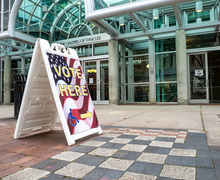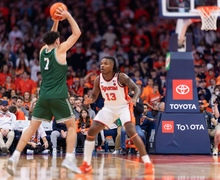Liberal : GOP debates leaves out valuable candidate insights
Some of the most interesting viewpoints in the GOP presidential race are being left out.
Buddy Roemer and a few other GOP candidates have not been able to debate their fellow candidates. For candidates like Roemer who do not get, or allow, large donations, promoting their campaigns can be difficult. If we are to elect a president or nominee we have to know about all the options. Unfortunately, our presidential debates are falling short.
The way we get political news tends to consist of horserace-style coverage between a few major candidates. Third-party candidates and minor candidates are not reported on because they aren’t seen as threats. Instead, they’re seen as unelectable and unimportant to the political process.
Media outlets also have some power to shape political debate and policy options. This is referred to as the ‘agenda-setting effect’ by political scientists. By covering only the major candidates, voters are less likely to be fully informed as to who is best suited to be the nominee. Many Republicans and independents may have never heard of Roemer.
One way to better inform the public would be to hear from the other candidates. Republicans have held 20 debates so far. Similar questions and responses from the candidates have lowered the quality of the debates. Many moderators have failed to properly scrutinize the candidates. Time in debates is spent asking softball questions and unqualified questions from Facebook and Twitter.
Variations of questions like ‘Why do you think you’re best suited to defeat President Obama?’ or ‘What is your plan to create jobs?’ are asked in nearly every debate. Not only are these questions repetitive, but they aren’t difficult to answer. Adding Roemer into the mix could not only make debates livelier, but could increase the substantive discussion between candidates.
Roemer, who has just as substantial a political history as the other candidates, offers distinctly different viewpoints on the issues, especially on the corrupting influence of money in politics. He could do a better job challenging his fellow candidates’ viewpoints than moderators have been doing.
Debate hosts and some viewers, though, don’t always agree that more voices are better. Minor candidates may detract from the debate. To solve this problem, candidates usually have to meet a minimum polling number to be allowed to debate.
In New Hampshire, CNN initially wanted Roemer to meet a certain poll number. When Roemer satisfied these requirements, a different standard was used to exclude him. He then had to raise a certain amount of money to be allowed in. Roemer and Texas Gov. Rick Perry were tied in polling in New Hampshire but only Perry appeared in the debate.
While the journalists who moderate debates are supposed to be unbiased, the exclusion of Roemer challenges this. Network managements’ decisions to change rules to specifically exclude candidates reflect an unacceptable bias.
There need to be clear-cut rules to determine who should be allowed to debate. Networks and parties can still be in charge of creating these rules, but they do a disservice to the public watching by manipulating them. Debates are an important way for the public to learn about the candidates.
Our democracy is hurt when candidates who have less money are excluded from debating. We’ve reached a point where money can buy exposure. In turn, it’s serving to limit who gets coverage. Our presidential races are not a true competition between the best ideas and experience. Roemer and other minor GOP candidates should be allowed to debate. The public’s choices for whom to elect should not be filtered. Opening up debates is one way to better select who represents us.
Harmen Rockler is a junior newspaper journalism and political science major. His column appears every Monday. He can be reached at horockle@syr.edu.
Published on January 22, 2012 at 12:00 pm





